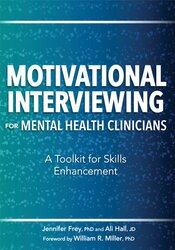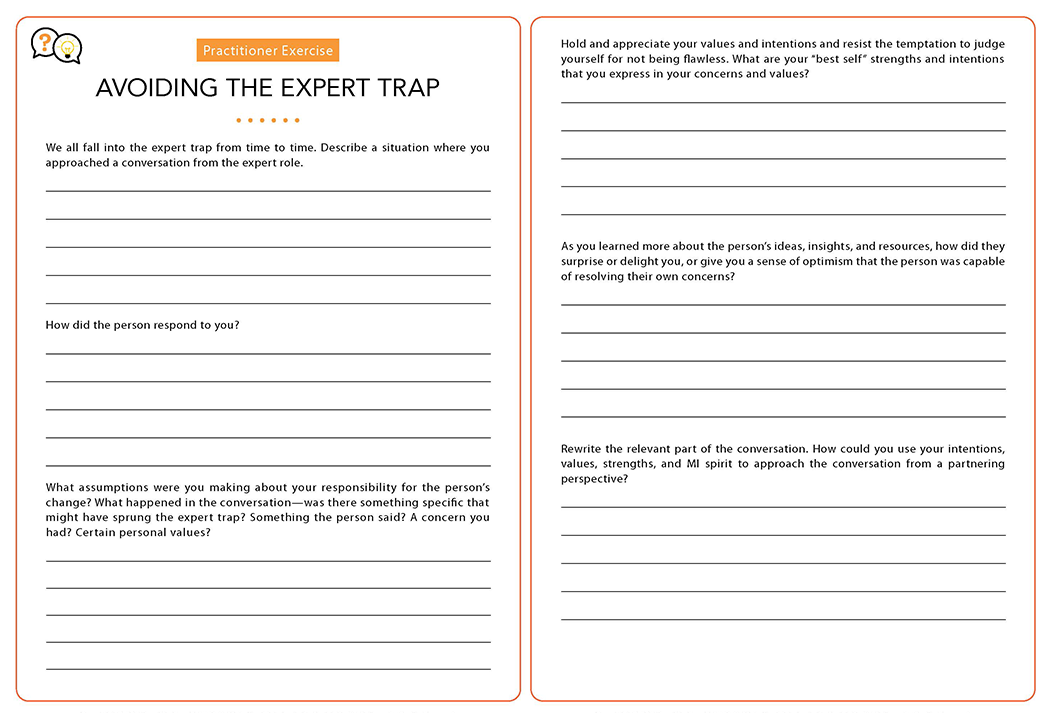Avoiding the Expert Trap
Learning to embody the motivational interviewing spirit with a free exercise from Motivational Interviewing for Mental Health Clinicians

Many helping professionals want to decrease the amount of power struggles in their helping conversations. It may feel like there is an overwhelming burden on your shoulders due to your felt need to fix your clients. However, the truth is that we cannot fix other people.
We care, and we are genuinely concerned at times. We have terrific ideas for the other person to try, yet if we approach the conversation as the sole expert in the room, we can cause a rupture in our rapport.
Instead, what would it be like to steer clear of the expert trap and share the table of expertise with our clients?
Could we actually enhance our treatment outcomes and strengthen the helping relationship?
The answer to these questions may lie within the practice of Motivational Interviewing (MI).
MI is used in mental health settings to increase service effectiveness through enhancing engagement, retention, and long-term behavior change. MI is particularly helpful when working with people who are reluctant to engage in mental health services and/or distrust mental health practitioners. Outcomes include increased self-efficacy for managing health conditions and decreased depression and high-risk behaviors.
One important aspect of Motivational Interviewing is the MI spirit, which can be described as having four distinct and synergistic components: partnership, compassion, acceptance, and evocation. The spirit of MI is a mindset and heartset that informs our conversations with others. It is the good soil that nourishes change, the background music without which the words are hollow. Simply by wanting to help people change, we bring some of the heartset and mindset vital to an MI approach and in some ways are already expressing MI spirit.
This self-reflection exercise helps you move from a tense expert stance to an open, relaxed, and curious stance that is consistent with the spirit of MI.
Some MI practitioners find it helpful to keep exercises like this somewhere close so that they can review them when needed. Regular, even daily, self-reflection on our practice increases our ability to recognize opportunities to shift into even more effective MI practice.
Want to learn more about motivational interviewing? Get another free exercise in my blog written with Jennifer Frey, PhD: Turning “What’s Wrong” into “What’s Strong.”
We care, and we are genuinely concerned at times. We have terrific ideas for the other person to try, yet if we approach the conversation as the sole expert in the room, we can cause a rupture in our rapport.
Instead, what would it be like to steer clear of the expert trap and share the table of expertise with our clients?
Could we actually enhance our treatment outcomes and strengthen the helping relationship?
The answer to these questions may lie within the practice of Motivational Interviewing (MI).
MI is used in mental health settings to increase service effectiveness through enhancing engagement, retention, and long-term behavior change. MI is particularly helpful when working with people who are reluctant to engage in mental health services and/or distrust mental health practitioners. Outcomes include increased self-efficacy for managing health conditions and decreased depression and high-risk behaviors.
One important aspect of Motivational Interviewing is the MI spirit, which can be described as having four distinct and synergistic components: partnership, compassion, acceptance, and evocation. The spirit of MI is a mindset and heartset that informs our conversations with others. It is the good soil that nourishes change, the background music without which the words are hollow. Simply by wanting to help people change, we bring some of the heartset and mindset vital to an MI approach and in some ways are already expressing MI spirit.
This self-reflection exercise helps you move from a tense expert stance to an open, relaxed, and curious stance that is consistent with the spirit of MI.
Some MI practitioners find it helpful to keep exercises like this somewhere close so that they can review them when needed. Regular, even daily, self-reflection on our practice increases our ability to recognize opportunities to shift into even more effective MI practice.
Want to learn more about motivational interviewing? Get another free exercise in my blog written with Jennifer Frey, PhD: Turning “What’s Wrong” into “What’s Strong.”
Learn to Incorporate Motivational Interviewing Into Your Practice

Conversations about change can be challenging. In this motivational interviewing (MI) toolkit, you will find a variety of tools and strategies designed to help you apply the spirit of MI so you can more effectively evoke people’s own interests, experiences, and good ideas for change. Designed for mental health clinicians who want to deepen their learning and proficiency, this toolkit provides:
Most importantly, this toolkit offers a variety of flexible opportunities for you to actively practice the core skills of MI: Use them on your own, with a partner, with a team of colleagues, or within an MI learning community.
- Examples of how to use MI to support people experiencing a variety of mental health issues
- Activities to help you more deeply explore the fundamental concepts, spirit, and tools of MI
- Sample conversation scripts that demonstrate the MI skills in practice
- Exercises to assess your progress and gain confidence in your skills
Most importantly, this toolkit offers a variety of flexible opportunities for you to actively practice the core skills of MI: Use them on your own, with a partner, with a team of colleagues, or within an MI learning community.
Meet the Expert:
Ali Hall, JD, is a member of MINT and is an independent consultant and trainer. She designs and facilitates MI workshops in a wide variety of contexts, including training for trainers in a number of evidence-based practices, and provides consultation for organizational implementation. She is a co-developer of the Motivational Interviewing Competency Assessment (MICA), a coding and coaching tool for MI skill development.
Learn more about their educational products, including upcoming live seminars, by clicking here.
Learn more about their educational products, including upcoming live seminars, by clicking here.
Topic: Motivational Interviewing (MI)
Tags: Advice | Free Resources | How To | Strategies | Success | Therapy Tools | Wisdom






